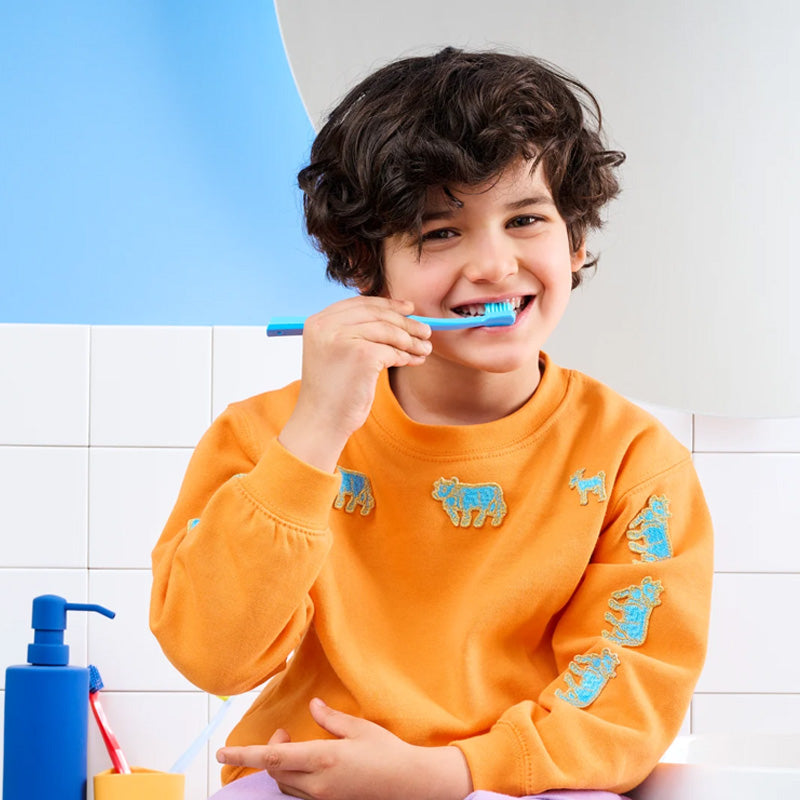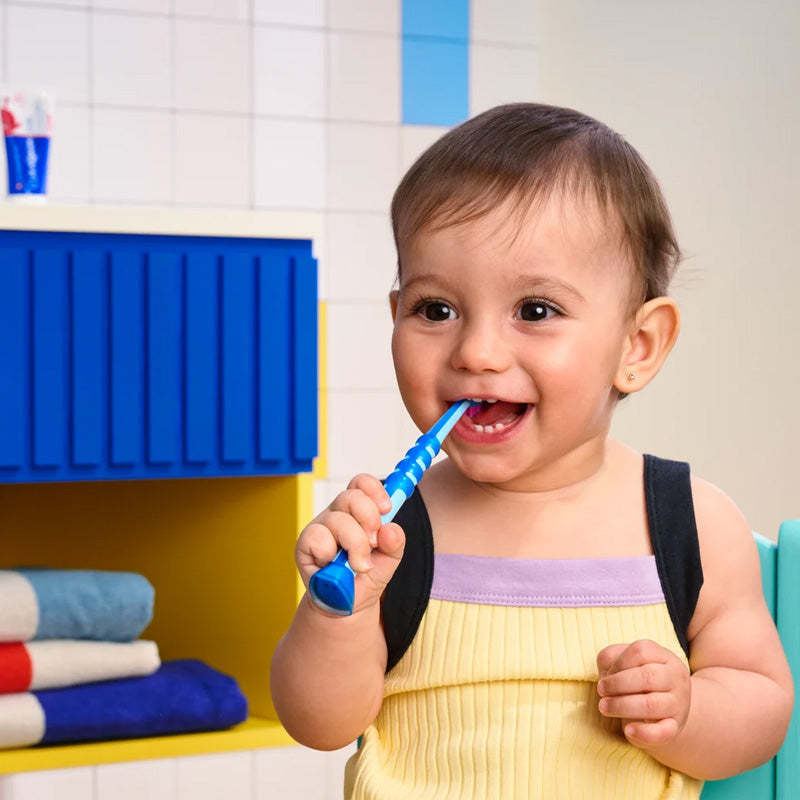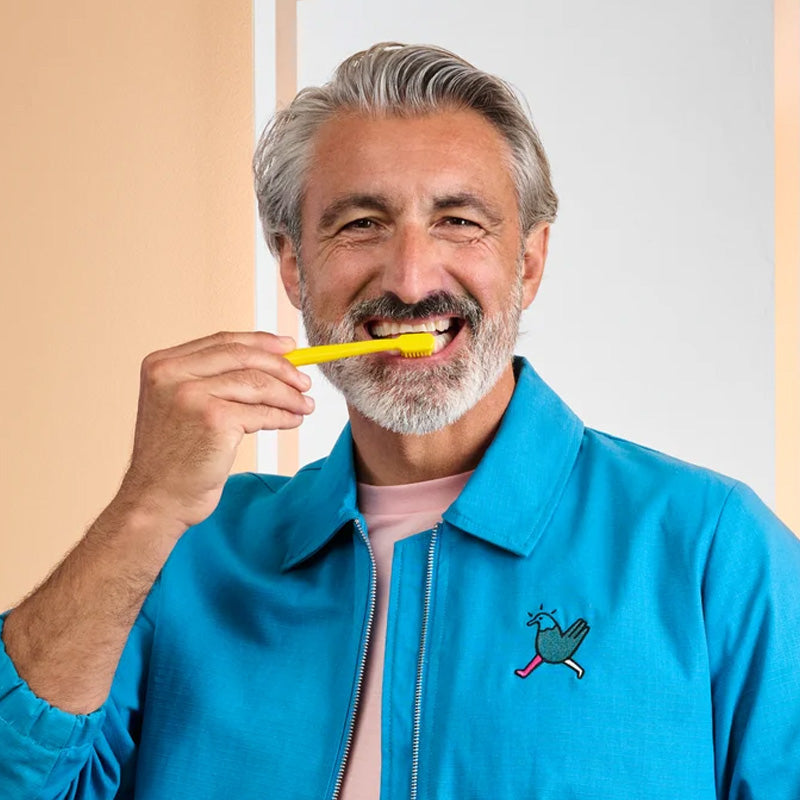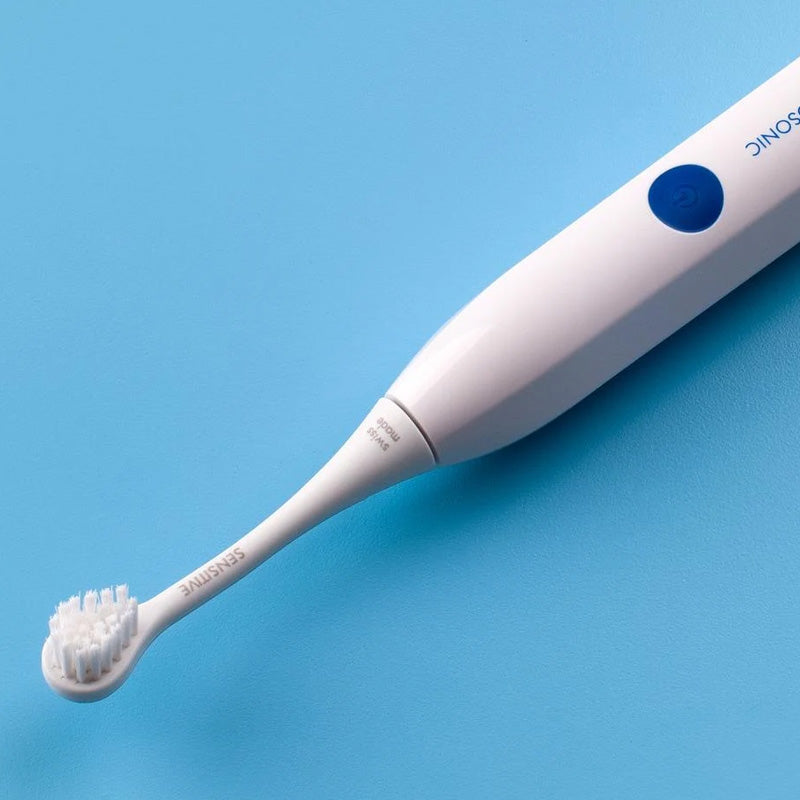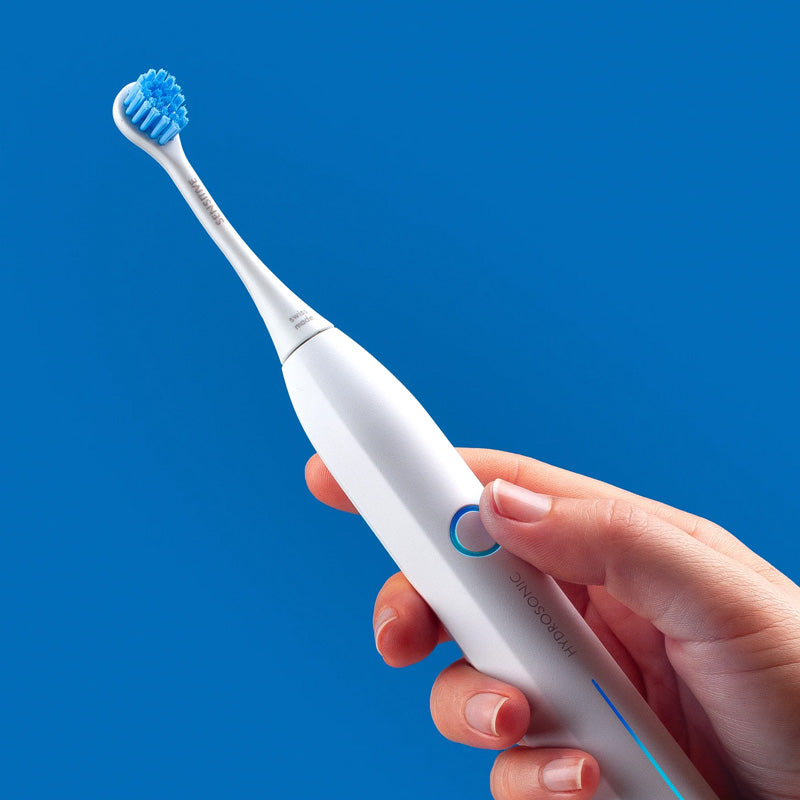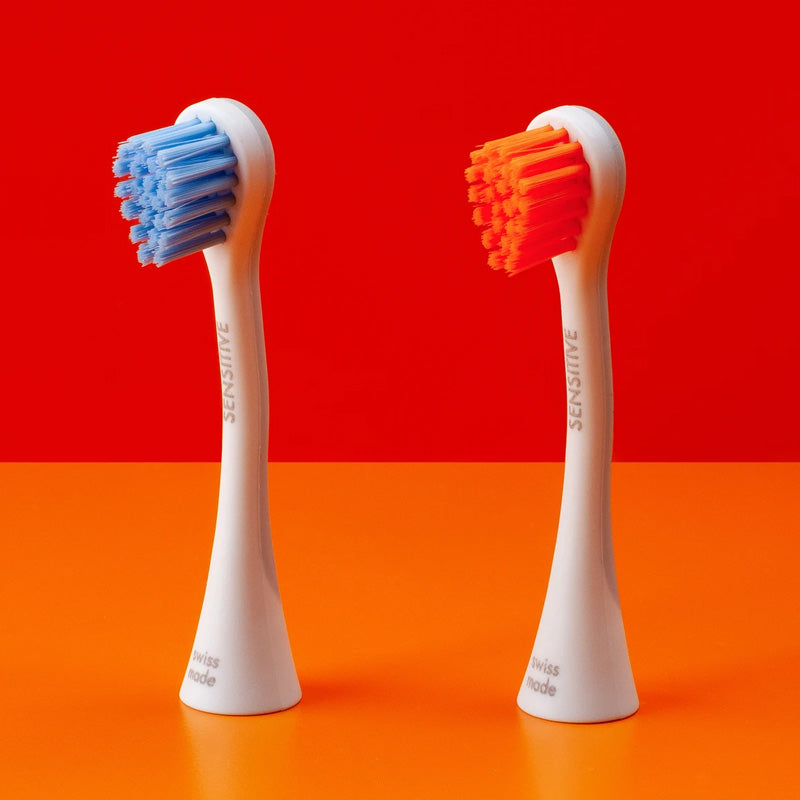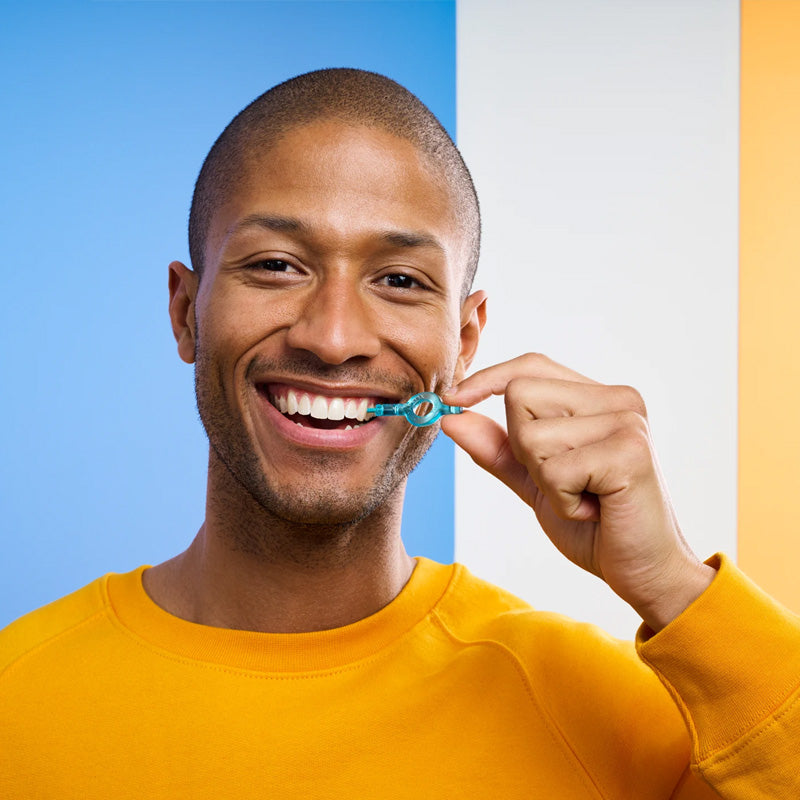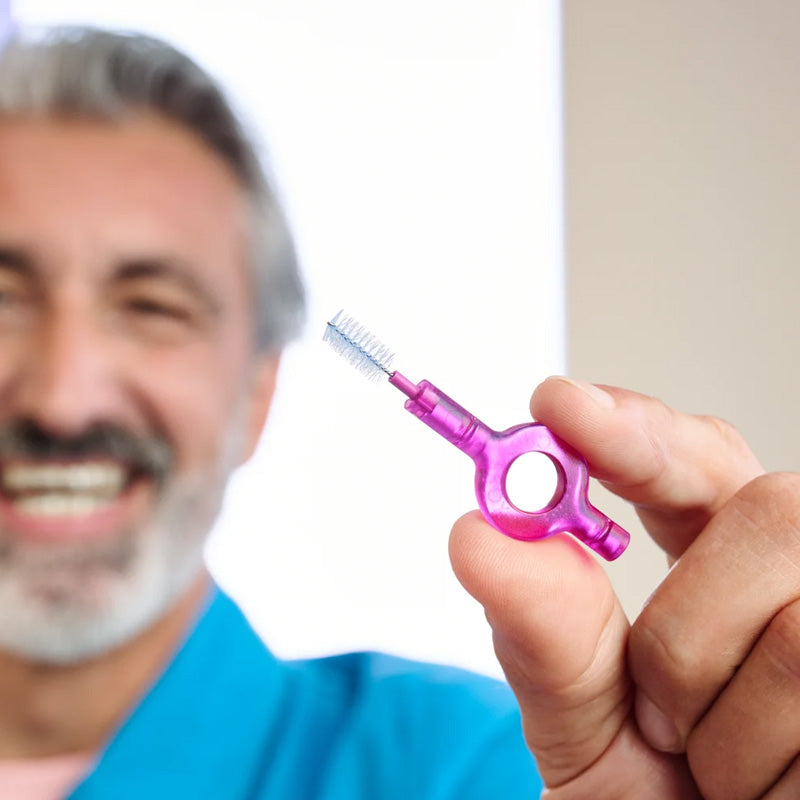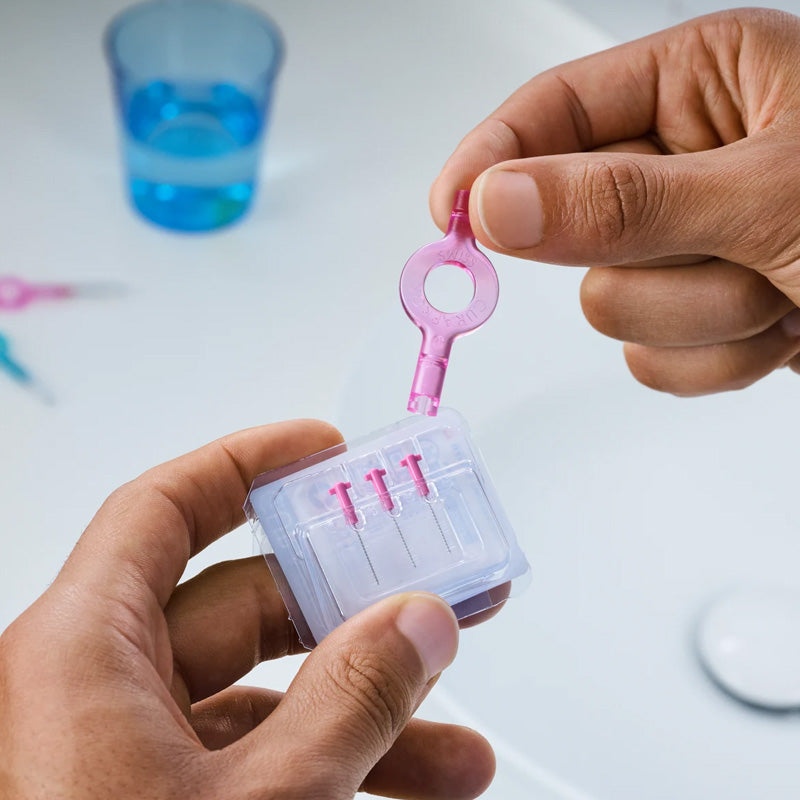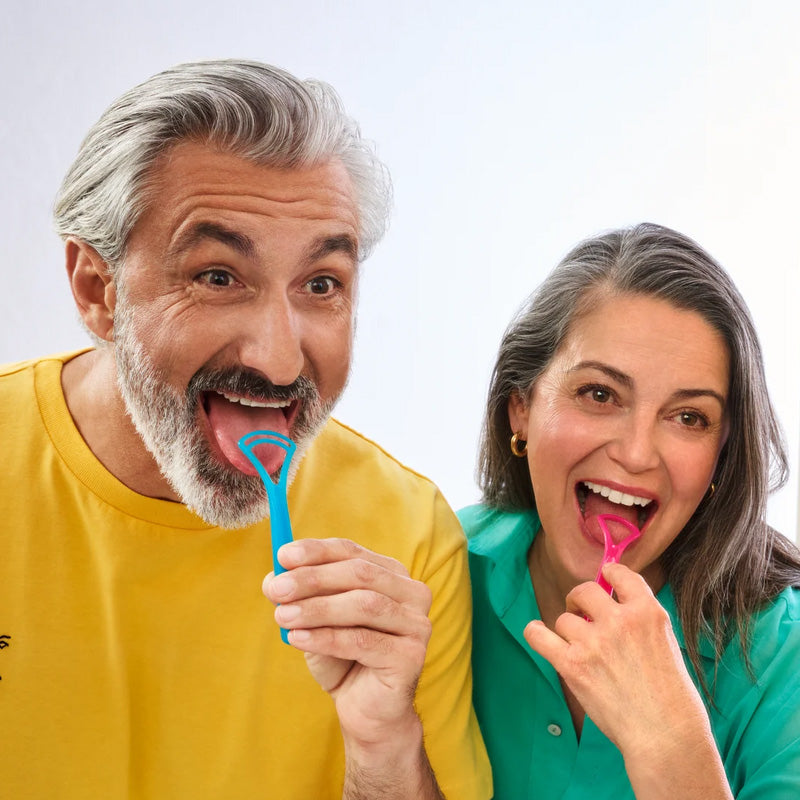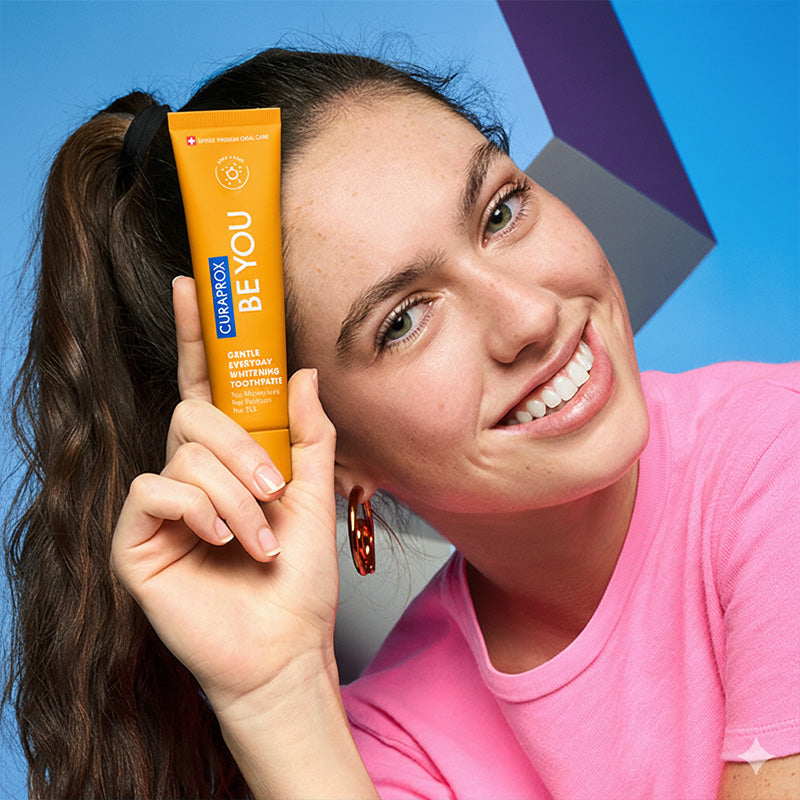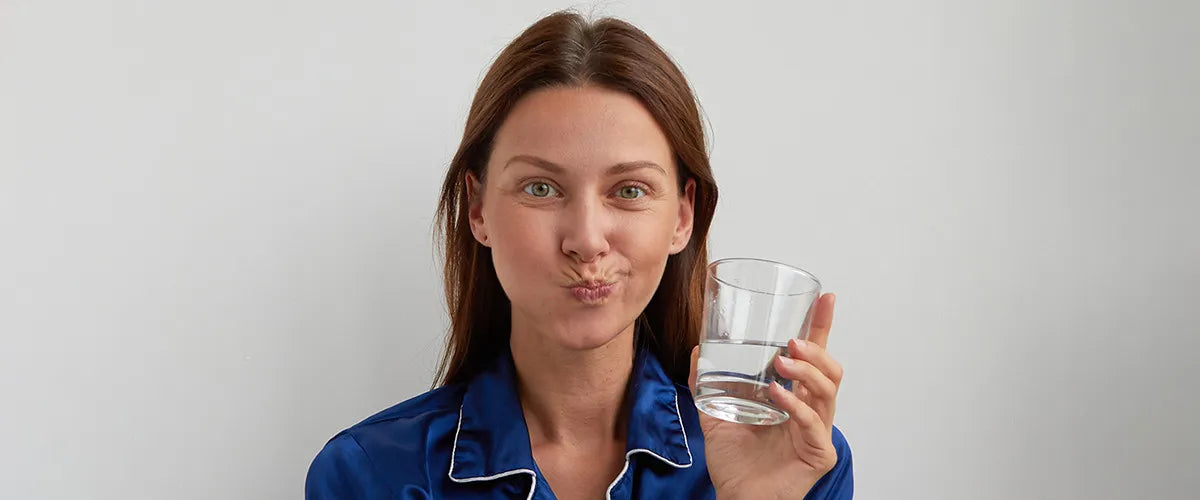Unlike regular mouthwashes, medicated mouth rinses aren’t a product for daily oral care. They should only be used for a specified period to achieve a specific outcome. In this article, you can discover the differences between mouthwashes and therapeutic mouth rinses, what you can use mouthwashes for and what else there is to know about using mouthwash correctly.
What is a mouthwash?
Mouthwash is a concentrated solution which has antibacterial or antiseptic properties. In addition to antiseptic Chlorhexidine (CHX), which is commonly used in dentistry, effective mouthwashes also contain bioflavonoids such as Citrox®. These support the antibacterial properties of Chlorhexidine.
Other possible ingredients include fluoride, which strengthens tooth enamel, and hyaluronic acid. Hyaluronic acid regulates the moisture content of the oral mucosa and contributes to faster healing after surgery or diseases in the oral cavity. Essential oils such as eucalyptol and menthol provide a pleasant taste and fresh breath.
What is the difference between a medicated and a commercial mouthwash?
Medicated mouthwashes are for post-operative or therapy-accompanying use after dental interventions or in treating oral diseases as they help regenerate the oral biome. They should only be used for a limited period following instruction by a dental specialist.
Commercial mouthwashes or mouth rinses, on the other hand, are cosmetic products that are primarily used to freshen the breath. There is also a difference in the composition: While medical mouthwashes are usually sold ready-to-use, mouth rinses can be concentrated and then must be diluted with water.

It’s important to note that neither medical nor cosmetical mouthwashes should be used permanently. In most cases, thorough dental care using toothbrushes and interdental brushes is sufficient to ensure optimal oral hygiene. By following this regimen, you should have fresh breath unless there are other issues to be aware of.
What does mouthwash do?
A high-quality mixture should be used before and after dental procedures as recommended by your dental professional. The following are reasons for using mouthwash.
Antibacterial
Depending on the formula, mouthwashes reliably remove bacterial plaque from teeth, gums and tongue. Antibacterial products often contain the antiseptic Chlorhexidine. It’s Chlorhexidine that ensures mouthwash isn’t only effective against bacteria, but also against fungal diseases of the oral mucosa. They also feature antioxidant and anti-inflammatory properties (see below). As a supplement to teeth brushing, antibacterial rinses also remove the germs that have accumulated in hard-to-reach places such as between the teeth or at the gumline.
Disinfecting
Chlorhexidine is responsible for disinfecting the mouth. This is especially important before and after dental procedures. It is therefore recommended to use a product that contains Chlorhexidine.
Cure for gingivitis
A medical mouth rinse can be used as an additional treatment for gingivitis or periodontitis. Typical symptoms of the condition such as bleeding gums can be prevented in this way.
Wound healing
After wisdom tooth extraction or other dental procedures, a suitable mouth rinse can effectively support and even accelerate the healing process. If you want to be sure that a product has the right formula for postoperative use, you should trust the recommendations of your dental professional.
Dental care and cavities prevention
By reliably preventing a build-up of plaque bacteria, mouthwashes are highly effective in preventing tooth decay. They also help to prevent porous areas from being damaged further by existing cavities.
If the product contains fluoride, this can also help to strengthen and remineralise tooth enamel.
Help against bad breath
Ingredients such as mint or eucalyptus will help freshen the breath for a short period, which consumers find satisfying. By reliably removing harmful bacteria, mouthwashes are indirectly effective against bad breath. However, the most effective way to prevent halitosis is to clean the teeth thoroughly with a toothbrush and to clean interdental spaces daily.
Good to know: To enhance the mouthwashes antibacterial properties, combine Chlorhexidine with bioflavonoids such as Citrox® — a natural bitter orange extract. This ensures the rinses taste good and don’t cause any taste irritation. In addition, PVP-VA is also used in all Perio plus rinses. This contributes to an extra strong protective film on the mucosa and teeth.
How to use mouthwash
The correct way to use mouthwash should be explained in detail on its packaging. Your dentist will also give you instructions on how to use it, and how often. However, there are some basic tips which can be applied to almost any product.
Timing: When to use?
Although mouth rinse and commercial mouthwash can be used independently of tooth brushing, it’s usually recommended to practise both cleaning steps – whether as a preventive measure or for supporting oral health in the case of diseases or after surgical procedures. Harmful bacteria is reliably removed and a protective biofilm remains on the teeth and gums.
Should I use it before or after brushing my teeth?
Whether mouthwash should be used before or after brushing can clearly be answered with "after." After all, the rinsing solution — just like brushing your teeth — serves to remove dirt such as food residues and plaque as well as harmful germs. A mouth rinse is most effective when it is integrated as the second step in your daily oral hygiene routine.
How many times a day should I use it?
It is best to use mouthwash every day after brushing your teeth, i.e. twice a day. Daily mouthwash use guarantees optimal effectiveness.
Duration: How long to leave in the mouth?
Dental professionals recommend leaving mouth wash in the mouth for at least 60 seconds without rinsing your mouth with water afterwards. If you want to get it just right, you can use a timer. The solution should be spat out after use.
Why shouldn’t you rinse with water?
Rinsing your mouth with water after using mouthwash is counterproductive because it removes both the taste of the rinse and the active ingredients it contains. If the minty and sometimes overwhelming flavour isn’t desired, it’s better to choose milder products.
How long after rinsing can I eat or drink?
How long you shouldn’t eat or drink after using a mouth wash is clearly defined: The time between mouth wash use and your next meal should be at least 60 minutes. This is the only way to guarantee the best use of the product.

Side effects
Once you have found the right formula, you shouldn’t experience any side effects. A normal burning sensation can occur in the mouth right after use, which is caused by powerful ingredients, but this can be ignored as long as it doesn’t interfere with the taste. If this is too much, you can switch to an alcohol-free or milder product.
Due to the use of Chlorhexidine in mouthwashes, the following side effects may occur:
Changes in taste
For a period of up to four hours after rinsing, the perception of salty and bitter tastes may be impaired. Why these taste changes occur hasn’t yet been scientifically clarified beyond doubt.
Discolouration
While it is a harmless side effect, the use of mouthwashes containing Chlorhexidine can cause temporary discolouration of the teeth, gums and braces. To prevent this, coffee, tea, nicotine, red wine and fruit shouldn’t be consumed during use. The use of SLS (Sodium Lauryl Sulfate)-free toothpastes is also recommended in order to support the long-term effect of Chlorhexidine even better.
Increased tartar formation
An important side effect of the permanent intake of Chlorhexidine Gluconate (CHG) is increased tartar formation. Tartar is not harmful as such, but should be removed regularly by a dental professional.
All the side effects described above are either rare or harmless, so there is no reason to avoid medical mouthwashes — especially if they are used correctly and for a limited amount of time.
Allergies
Occasionally, an allergic reaction may occur and you may experience:
- Redness
- Swelling
- Unnatural burning sensation
- Tingling
- Itching of the oral mucosa or lips
If these symptoms occur, stop using the respective product immediately and consult your dental professional.
FAQ - Frequently asked questions
These were the most important things to know. In the following, we will go into more specific questions that may arise in connection with the use of mouthwashes.
Is it useful to use mouthwash?
Medical mouthwash is useful to treat oral diseases according to the instructions given by your dental professional. For everyday use, however, the combination of toothbrushes and interdental brushes is sufficient for optimal oral hygiene.
Can mouthwash be harmful?
Used regularly and correctly, a good mouthwash can improve dental and oral health. If instructions are correctly followed, a formula containing Chlorhexidine is a suitable supportive therapy for treating oral diseases.
A medical mouthwash can become harmful if it’s used too frequently, incorrectly or without a doctor's recommendation. Medical or therapeutic products should therefore only be used for a limited period; for pre- or post-operative care or for accompanying therapies for oral diseases. Non-medical brands, on the other hand, can be used daily — ideally as an integral part of your oral hygiene routine after brushing your teeth.
Is mouthwash with alcohol harmful?
For long-term use, mouthwash containing alcohol can dry out and irritate the oral mucosa. A dry oral mucosa can promote cavities and the formation of aphthae (ulcers). Products containing alcohol aren’t suitable for children.
Can mouthwash be used during pregnancy?
Alcohol-free solutions help to maintain oral health during pregnancy. Even those who suffer from periodontitis during pregnancy can use ethanol-free solutions as prescribed by a doctor without any issues.
Is mouthwash suitable for children?
Children from the age of six can use a mild, alcohol-free mouthwash. However, the first use should be supervised by an adult to avoid possible swallowing or other mistakes.
Mouthwash swallowed - is that dangerous?
It is very important that you avoid swallowing medical products as they are potentially dangerous when consumed. Ingredients such as Chlorhexidine, fluoride or certain essential oils aren’t suitable for consumption.
How dangerous it is will depend on the swallowed dosage. If you have only swallowed a small amount, you should rinse your mouth clean and drink larger quantities of water.
You should immediately contact a medical professional if a large amount of mouthwash has been swallowed. If you swallow large quantities and don’t seek help, there is a risk of nausea, vomiting and poisoning.
Can I use mouthwash instead of brushing my teeth?
If mechanical cleaning isn’t possible due to dental procedures, a medical wash can prevent harmful bacteria from settling in your mouth. However, this should only be used over a short period of time. A medicated mouthwash isn’t an adequate or permanent substitute for brushing your teeth.
Does it make sense to mix mouthwash into an oral irrigator?
To ensure the oral irrigator isn’t damaged, medical mixtures shouldn’t be added.
What happens when discolouration occurs?
Mouthwash can sometimes lead to discolouration of the teeth if they contain ingredients such as Chlorhexidine. Furthermore, the consumption of coffee, tea, nicotine, red wine and spices like curry can all have an effect on possible discolouration for the duration of use. Specially formulated products should therefore only be used for a limited time. Thankfully, potential tooth staining is reversible.
Apart from fresher breath, smokers don’t benefit from mouthwashes. Nicotine is one of the major substances that cause tooth discolouration. Despite this, using mouthwash is usually not a problem — especially for smokers who have their teeth professionally cleaned once or twice a year, as recommended.
Why does my mouth burn when rinsing?
If a mouthwash solution causes a burning sensation in the mouth, this may be due to some of the ingredients it contains such as menthol, and ethanol (i.e., alcohol), or there might be an individual intolerance. A burning sensation shouldn’t be tolerated long term. If the burning continues, you might consider using a milder wash.
Can mouthwash be diluted?
Most products are ready to use in their undiluted form — unless the instructions on the packaging say otherwise. Although a diluted mouthwash is suitable for freshening the breath, it wouldn’t be as effective for tooth enamel and gum health.
When can rinses be used after wisdom tooth surgery?
Brushing your teeth is difficult and sometimes even impossible in the first few days after surgery. Therefore, rinsing the mouth with an antibacterial mouthwash is advisable about 24 hours after tooth surgery. You shouldn’t, however, rinse your mouth immediately after tooth extraction — this is to avoid loosening the natural wound closure (blood clot) which is supposed to start the healing process. It is best to follow the instructions given to you by your dental professional.
How long should you use mouthwash for a tongue piercing?
Regular use of mouthwash after a tongue piercing is advisable as it speeds up the healing process. It takes around three to six weeks for the piercing canal to heal completely.
Does mouthwash help with periodontal disease?
Provided it is used correctly and regularly, medical mouthwash can treat periodontitis both preventively and as an adjunct to treatment.
Does mouthwash help against aphtae (ulcers)?
Aphtae (mouth ulcers) can have many causes, so whether the painful blisters that form in the mouth respond to mouthwash or not will depend on the underlying condition. Mouthwash should help relieve the pain caused by ulcers and heal oral lesions by improving overall oral hygiene.
Does mouthwash help with tonsillitis and a sore throat?
Although the antibacterial and anti-inflammatory properties of mouthwash improve oral hygiene, how effective it is for tonsillitis is a controversial topic. Other organic remedies can also be helpful for tonsillitis. Sage and camomile tea can be used as a natural alternative for gargling. Certain medicinal mouthwashes aren’t suitable for gargling with a sore throat. They are therefore not recommended for relieving discomfort.
Is mouthwash useful during chemotherapy?
Inflammation of the mucous membrane in the mouth and throat can occur as a symptom of various cancer treatments such as chemotherapy and radiotherapy. Therefore, consistent oral hygiene is particularly important for cancer patients. However, it hasn’t been sufficiently proven whether medical mouth wash alleviate the possible side effects of chemotherapy.
Does mouthwash help against discolouration?
Mouthwashes with whitening technology are designed to make your teeth shinier and whiter. The answer to the question of which mouthwash doesn’t discolour the teeth is straightforward: Conventional mouthwashes (without Chlorhexidine) don’t leave any discolouration on the teeth and are suitable for long-term use.
Does mouthwash help against tartar build-up?
Enriched with essential oils, fluoride and zinc, mouthwash is suitable for the prophylaxis of plaque, however, a possible effect on tartar formation hasn’t been sufficiently proven. The most efficient method of preventing plaque and tartar build-up is through thorough mechanical cleaning with a toothbrush and an interdental brush.
Mouthwashes and braces?
Braces can make it difficult to clean your teeth thoroughly. Regular mouthwash use is therefore encouraged while wearing fixed braces. As it comes in a liquid form, the antibacterial solution can get to all those hard-to-reach places.
Mouthwashes and implants?
Using mouthwash with fixed implants is also an excellent idea. It is not possible to brush your teeth during the first few days of an implant being inserted. Antibacterial, anti-inflammatory mouthwash will accelerate the healing process and keep the oral cavity healthy.
Read more
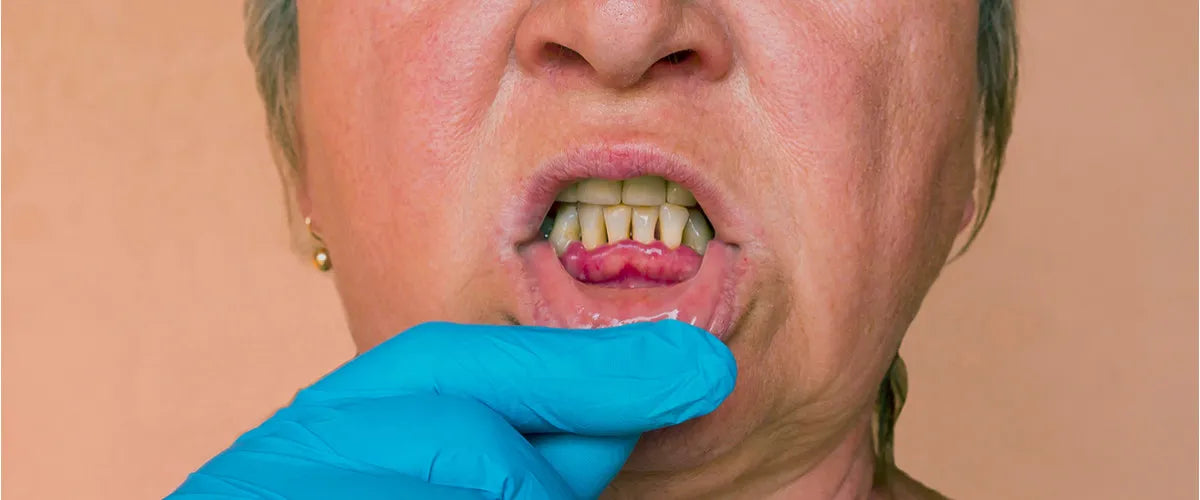
Almost every second person is affected – often without being aware of it. Periodontitis, also known as periodontosis, is the inflammation of the dental bed and the periodontium, which in advanced s...
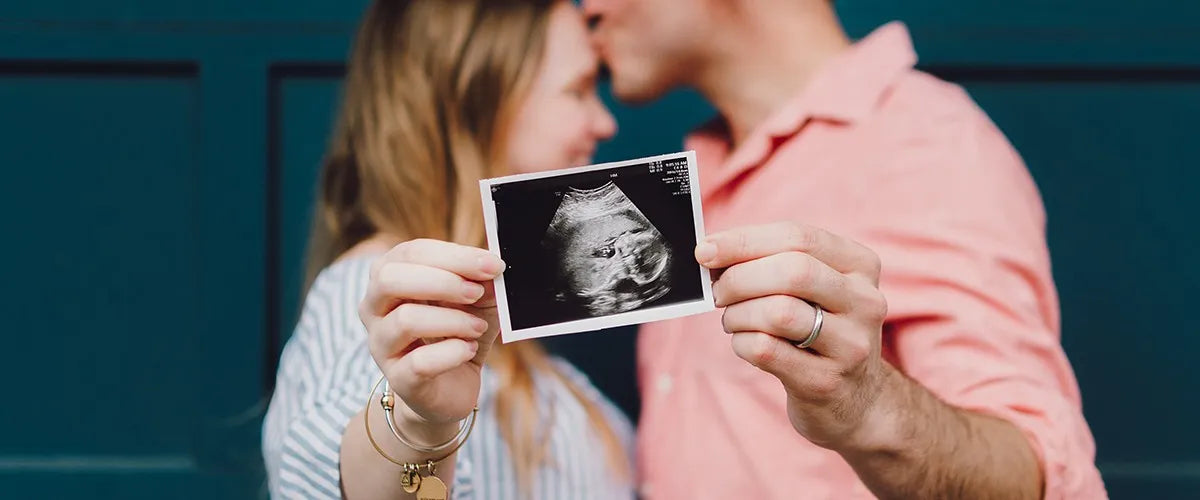
Learn about the risks to your oral health during pregnancy…… the best ways to keep your teeth and gums clean and healthy…… and how this can help to give your baby the best possible start in life. T...
